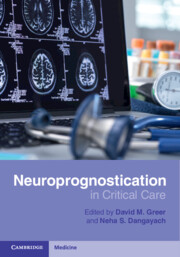Book contents
- Neuroprognostication in Critical Care
- Neuroprognostication in Critical Care
- Copyright page
- Epigraph
- Contents
- Contributors
- Chapter 1 Shared Decision Making
- Part I Disease-Specific Prognostication
- Part II Other Topics in Neuroprognostication
- Chapter 18 Prognostication in Palliative Care and Neurocritical Care
- Chapter 19 Prognostication in Chronic Critical Illness: Frailty, Geriatrics, Prior Severe Neurological Comorbidities
- Chapter 20 Prognostication in the Transition of Neurocritical Care: Neurorehabilitation and Placement, Role of Post-ICU Recovery Clinics, Insurance, Case Management
- Chapter 21 Religious and Legal Issues in Neuroprognostication
- Chapter 22 New Frontiers in Neuroprognostication: Machine Learning and AI
- Chapter 23 New Frontiers in Neuroprognostication: Biomarkers
- Chapter 24 New Frontiers in Neuroprognostication: Point-of-Care Ultrasonography
- Index
- References
Chapter 18 - Prognostication in Palliative Care and Neurocritical Care
from Part II - Other Topics in Neuroprognostication
Published online by Cambridge University Press: 14 November 2024
- Neuroprognostication in Critical Care
- Neuroprognostication in Critical Care
- Copyright page
- Epigraph
- Contents
- Contributors
- Chapter 1 Shared Decision Making
- Part I Disease-Specific Prognostication
- Part II Other Topics in Neuroprognostication
- Chapter 18 Prognostication in Palliative Care and Neurocritical Care
- Chapter 19 Prognostication in Chronic Critical Illness: Frailty, Geriatrics, Prior Severe Neurological Comorbidities
- Chapter 20 Prognostication in the Transition of Neurocritical Care: Neurorehabilitation and Placement, Role of Post-ICU Recovery Clinics, Insurance, Case Management
- Chapter 21 Religious and Legal Issues in Neuroprognostication
- Chapter 22 New Frontiers in Neuroprognostication: Machine Learning and AI
- Chapter 23 New Frontiers in Neuroprognostication: Biomarkers
- Chapter 24 New Frontiers in Neuroprognostication: Point-of-Care Ultrasonography
- Index
- References
Summary
Neuroprognostication, the focus of this book, is crucial toward the management of the highly complex patient in the neurological intensive care unit (Neuro ICU). It is of primary importance to understand the nature of the disease and the potential for recovery. Informed prognostication by neurologically trained physicians has been hypothesized to be a significant reason for the improved outcomes of neurological patients managed in a Neuro ICU versus general medical ICUs.[1]
Decisions surrounding withdrawal of life-sustaining therapies (WLST) are highly dependent on prognosis. In a retrospective study of Neuro ICU patients who were terminally extubated, family members surveyed most frequently cited quality of life, prognosis, and the patient’s previously known wishes as “very important” in their decision to remove life-sustaining therapy.[2]
Evidence-based prognostication in the Neuro ICU is difficult, and may be biased by the effect of WLST on patient mortality.
- Type
- Chapter
- Information
- Neuroprognostication in Critical Care , pp. 261 - 272Publisher: Cambridge University PressPrint publication year: 2024

